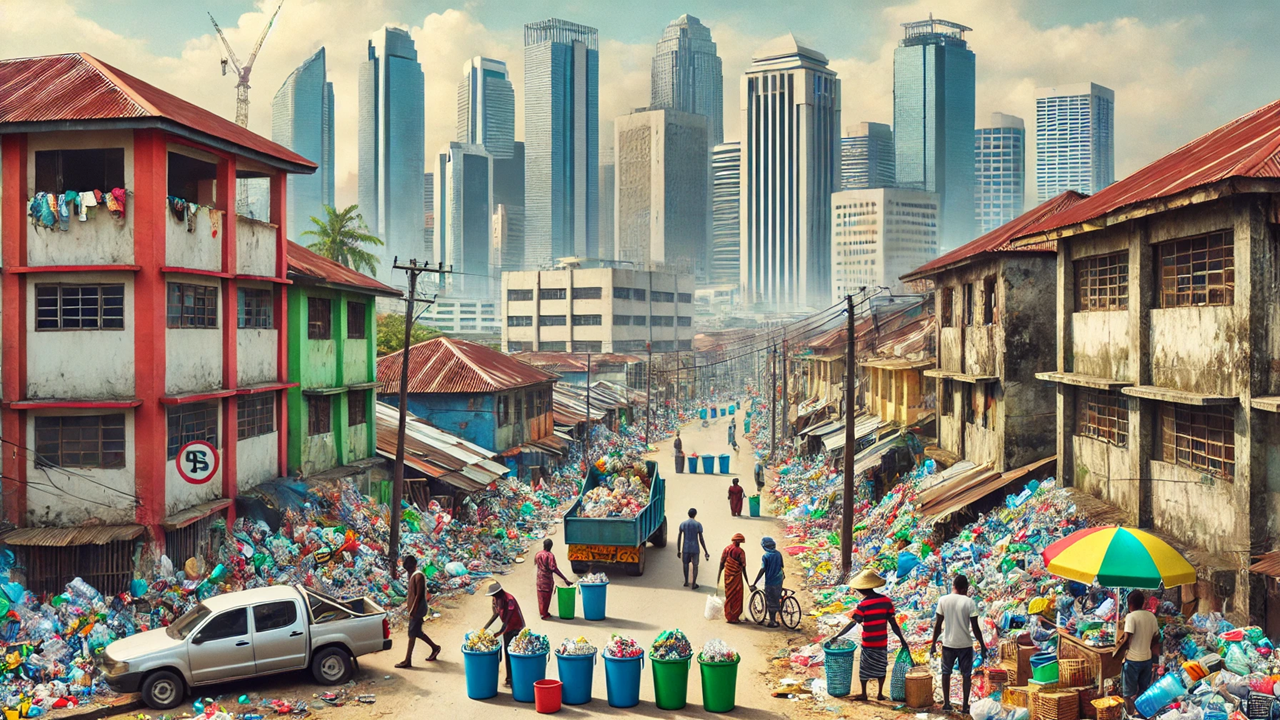Transforming Waste Management in Lagos: A Sustainable Roadmap
This article explores the findings and recommendations from the report "Improving Solid Waste and Plastics Management in Lagos State: A Way Forward." It highlights the challenges, such as inadequate infrastructure and policy gaps, and offers solutions including better waste segregation, financial sustainability, and behavioral change to promote a circular economy in Lagos.

Revamping Lagos' Waste Management System: Insights from a Comprehensive Report
A groundbreaking report, "Improving Solid Waste and Plastics Management in Lagos State: A Way Forward," sheds light on the pressing challenges of waste and plastic management in Lagos State, Nigeria. Published by PROBLUE and its affiliates, the report offers a robust blueprint to address systemic issues, promote sustainable practices, and advance a circular economy in Nigeria's economic hub.
Lagos State grapples with overwhelming waste management challenges. The state produces vast quantities of municipal solid waste (MSW), with recycling rates alarmingly low. Plastic waste dominates the composition, contributing significantly to marine pollution and urban flooding. The report underscores how these mismanagement practices harm public health, hinder economic growth, and degrade the environment.
Understanding the Challenges
The report identifies four core challenges impeding effective waste management in Lagos:
Policy and Institutional WeaknessesWeak enforcement of existing policies, insufficient implementation guidelines, and a lack of reliable data undermine systemic efficiency.
Inadequate Infrastructure A scarcity of waste segregation facilities, recycling plants, and treatment centers fuels dependency on open dumping and burning.
Behavioral Barriers The public’s limited awareness of proper waste practices, combined with entrenched convenience-driven habits, hampers recycling efforts.
Financial Constraints With Lagos allocating only 2% of its budget to waste management, the state lags far behind the recommended 5% necessary for infrastructure development.
Strategic Objectives and Opportunities
The report focuses on enhancing waste management practices through several targeted objectives:
Strengthening capacity and understanding of solid waste management (SWM).
Promoting sustainable plastic management aligned with the 3R principles—reduce, reuse, recycle.
Addressing marine plastic pollution and fostering frameworks for extended producer responsibility (EPR).
Key Findings: Behavioral and Economic Insights
One standout revelation involves the behavioral gaps in waste disposal. Surveys reveal poor accountability and limited knowledge of recycling options among residents. However, the report also emphasizes the economic potential of improved waste management practices. By transitioning toward better systems, Lagos could unlock job opportunities, reduce greenhouse gas emissions, and stimulate circular economic models.
Additionally, analysis at the Olusosun dumpsite reveals that plastics constitute a proportion equal to organic waste, highlighting the critical need for effective segregation to harness recycling potential.
Recommendations: A Roadmap for Action
The report proposes actionable solutions for both the national and state levels:
Strengthening Policy Frameworks Develop enforceable regulations and KPIs to ensure accountability. Encourage private sector involvement through transparent public-private partnerships (PPPs).
Enhancing Infrastructure Prioritize investments in engineered landfills, sorting facilities, and medical waste treatment plants. Establish incentives for recycling industries and material recovery facilities.
Fostering Behavioral Change Launch public awareness campaigns targeting waste segregation and recycling. Leverage community engagement to instill accountability and foster a sustainable culture.
Ensuring Financial Sustainability Introduce cost-reflective tariffs, green bonds, and taxes on virgin plastics to secure funds for comprehensive waste management.
Lagos State: A Pilot for Change
The report also highlights Lagos as an ideal testbed for innovative solutions. Pilot programs focused on waste segregation at source and alternatives to single-use plastics in hospitality could pave the way for broader implementation. Establishing robust data collection mechanisms will further aid policymakers in refining strategies.
Towards a Sustainable Future
The publication concludes with a vision for a cleaner, greener Lagos. By embracing collaborative efforts between governments, private sectors, and local communities, the state can overcome systemic gaps and move toward sustainable waste management. This transition not only promises a healthier environment but also fosters inclusive economic growth.
The report "Improving Solid Waste and Plastics Management in Lagos State: A Way Forward" serves as a vital roadmap for addressing Lagos' waste management crisis, offering practical recommendations to mitigate challenges and reduce marine pollution.
- FIRST PUBLISHED IN:
- Devdiscourse










